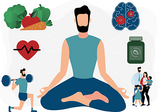
Jhoshue veras
- Subject:
- Anthropology
- Material Type:
- Homework/Assignment
- Author:
- Jhoshue veras
- Date Added:
- 12/16/2022

Jhoshue veras
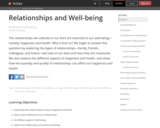
The relationships we cultivate in our lives are essential to our well-being—namely, happiness and health. Why is that so? We begin to answer this question by exploring the types of relationships—family, friends, colleagues, and lovers—we have in our lives and how they are measured. We also explore the different aspects of happiness and health, and show how the quantity and quality of relationships can affect our happiness and health.
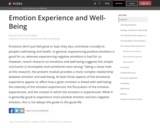
Emotions don’t just feel good or bad, they also contribute crucially to people’s well-being and health. In general, experiencing positive emotions is good for us, whereas experiencing negative emotions is bad for us. However, recent research on emotions and well-being suggests this simple conclusion is incomplete and sometimes even wrong. Taking a closer look at this research, the present module provides a more complex relationship between emotion and well-being. At least three aspects of the emotional experience appear to affect how a given emotion is linked with well-being: the intensity of the emotion experienced, the fluctuation of the emotion experienced, and the context in which the emotion is experienced. While it is generally good to experience more positive emotion and less negative emotion, this is not always the guide to the good life.

Student Care Guidebook
Word Count: 51032
(Note: This resource's metadata has been created automatically by reformatting and/or combining the information that the author initially provided as part of a bulk import process.)

Keynote presentations, workshop materials, and other helpful resources from the 2020 Partnerships for Well-Being Institute hosted by Human Services at UC Davis Continuing and Professional Education. This includes content from both the June 3 Virtual Mini-Institute and the in-person institute currently scheduled for Dec. 8-10 in Garden Grove, CA.
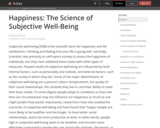
Subjective well-being (SWB) is the scientific term for happiness and life satisfaction—thinking and feeling that your life is going well, not badly. Scientists rely primarily on self-report surveys to assess the happiness of individuals, but they have validated these scales with other types of measures. People’s levels of subjective well-being are influenced by both internal factors, such as personality and outlook, and external factors, such as the society in which they live. Some of the major determinants of subjective well-being are a person’s inborn temperament, the quality of their social relationships, the societies they live in, and their ability to meet their basic needs. To some degree people adapt to conditions so that over time our circumstances may not influence our happiness as much as one might predict they would. Importantly, researchers have also studied the outcomes of subjective well-being and have found that “happy” people are more likely to be healthier and live longer, to have better social relationships, and to be more productive at work. In other words, people high in subjective well-being seem to be healthier and function more effectively compared to people who are chronically stressed, depressed, or angry. Thus, happiness does not just feel good, but it is good for people and for those around them.
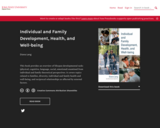
This book provides an overview of lifespan developmental tasks (physical, cognitive, language, social, emotional) examined from individual and family theoretical perspectives. It covers topics related to families, diversity, individual and family health and well-being, and reciprocal relationships as affected by external factors.

In this course, we will study resilience and well-being to prevent burnout, traumatic stress, and compassion fatigue for social services and mental health professionals, healthcare providers, emergency first responders, and other relationship-intense occupations.We will explore the causes, symptoms, and effects of traumatic stress, burnout, compassion fatigue, and other work-related stress, with a keen focus on enhancing quality of life and improving a healthy lifestyle by incorporating evidence-based practices in psychological and emotional resilience training, cognitive behavioral therapy, mindfulness, positive psychology, prevention, peer support, and self-care, including nutrition, exercise, and sleep. Finally, we will explore strategies that function as preventative medicine to help mitigate the potential harmful effects of highly stressful careers.

Created by Michael Krahn & Gabriel Robinson, "Physical Skills & Well-Being - Kindergarten" is used as a safe, healthy, & fun lesson plan for kindergarteners that teaches them the importance physiccal activity, healthy diets, keeeping up with responsibilities affects their well-beings, created in a way that is easy and accesible for children aged 4-6 in the kindergarten education level.
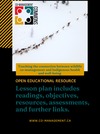
These open-access journal articles provide qualitative evidence showing the connections between Indigenous health and well-being and wildlife co-management. A lesson plan is also provided for potential professors or co-management board practitioners wishing to study independently.

The two lesson plans were created by myself (Michael Krahn) and partner, Gabe Milosovic.
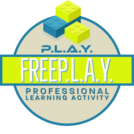
Welcome to "The Mindful Teacher: Cultivating Presence and Well-Being" activity. Teaching can be a challenging and demanding profession, and it is essential for teachers to take care of their well-being. Mindfulness is a practice that can help teachers cultivate presence, awareness, and emotional regulation, leading to reduced stress, improved well-being, and better student outcomes. This activity will introduce you to the concept of mindfulness, and its benefits, and provide you with practical tools to incorporate mindfulness into your daily life.

This lesson explores the concepts of personal and cultural identity and asks students to reflect on how their own sense of identity might impact their health. The lesson provides a holistic look at the different types of health people experience. While the lesson acknowledges that discrimination based on identity is an unfortunate fact of life for many people, identity can also be used as a springboard to better health. This concept is explored in the second activity. The lesson also draws on examples from Native American culture to show how survivance and physical identity expression can support a positive experience of health.
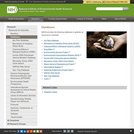
Today the NIEHS is expanding and accelerating its contributions to scientific knowledge of human health and the environment, and to the health and well-being of people everywhere. It provides the following databases & galleries as resources to scientists: The Alu Pairs Database, The Biomarkers of Oxidative Stress Study (BOSS), Chemical Effects in Biological Systems(CEBS), The Drug Matrix, The Environmental Genome Project, The Environmental Polymorphisms Registry, The Human DNA Polymerase Gamma Mutation, The Microarray Center cDNA Clone Search, Mouse Genome Resequencing Project, The Nanomaterial Registry, The Roadmap Epigenomics Project Data, The SNPinfo Web Server and the Spin Trap Database.
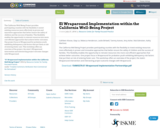
The California Well Being Project provides participating counties with the flexibility to invest existing resources more effectively in proven and innovative approaches that better ensure the safety of children and the success of families. This flexibility enables the opportunity to reinvest resources into more cost efficient approaches that achieve better outcomes. One project focus is Wraparound for probation youth exhibiting delinquency risk factors that put them at risk of entering foster care. This workshop offers an overview of the project, the state’s Wraparound intervention and intersecting project outcome changes with Wraparound.
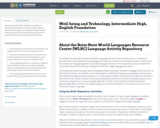
How social media effects daily life, positively or negatively. Practicing the ability to argue whether banning technology on a university/college campus would a good or bad and the effect it would have on students, professors, and associated businesses.

Students will learn about a variety of mental health professionals. They will understand the similarities and differences between them. Another focus of this lesson will be on the role the mental health professionals play in our society. This lesson plan should ideally be followed by guest speakers who work in the mental health career field.
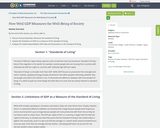
By the end of this section, you will be able to:Discuss how productivity influences the standard of livingExplain the limitations of GDP as a measure of the standard of livingAnalyze the relationship between GDP data and fluctuations in the standard of living
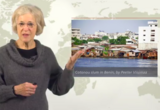
The video introduces health challenges for the very varied group of migrants. A large part voluntarily migrated, but non-voluntary groups include refugees, IDPs, Stateless and trafficked persons. Internal migrants are both due to conflicts and disasters and general urbanisation. The different groups have very varied health issues, and also very varied protective frameworks – whether international conventions or national laws and services - and may not be able or willing to seek health care.
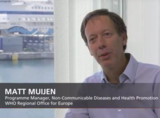
This lesson discusses and explains why mental health is difficult to define using international terminology. It also introduces why there is a much higher burden of disease linked with mental disorders in Europe compared to, for example, Africa. The session discussed why there is a different spending on mental health treatment in developing countries compared to western countries.
Participants: Dr. Matt Muijen.